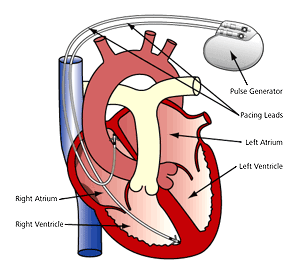A normal heartbeat comes from the heart’s natural pacemaker called the “sinus node.” When the sinus node sends signals, a wave of electricity then moves across the upper chambers of the heart causing the upper chambers to contract.
The electrical impulse then moves to the lower chambers of the heart resulting in contraction there.
These contractions allow for blood to be pumped to the body. This blood supplies the body with oxygen and nutrients, as well as eliminates waste products.
When the hearts natural pacemaker doesn’t function normally, an artificial pacemaker may be needed.
Some people are born with sinus dysfunction as a result of some congenital heart defects. As well sinus misfiring can also be the consequence of certain surgical procedures.
Many other patients may need a pacemaker with conditions such as abnormally fast heart rates, patients who pass out, patients on medications that slow the natural heart rate, patients with heart valves that leak, patients with an abnormally thick heart and patients with poor heart function.
An artificial pacemaker helps to restore the heart rhythm towards a normal rhythm. This improves the heart’s ability to circulate blood through the body and the wear and tear on the heart it self.
Ask your doctor for more information about on pacemakers.
